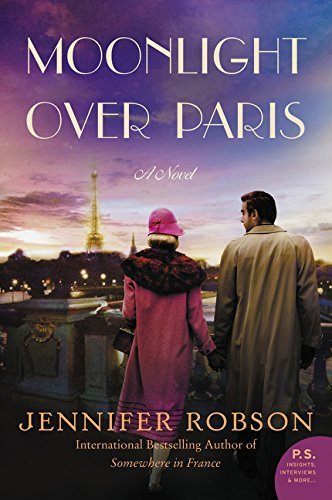Jennifer Robson, the internationally bestselling author of Somewhere in France and After the War is Over, shares insights into her writing journey and the inspiration behind her highly anticipated third historical novel, Moonlight Over Paris.
It follows the journey of a young aristocratic woman, Lady Helena Montagu-Douglas-Parr, who leaves London for France in an effort to follow her dream of becoming an artist in 1920s Paris following a broken wartime engagement.
The full interview is also available to download in audio format on Your Creative Life podcast.
You're the author of three books, Somewhere in France, After the War is Over and Moonlight Over Paris. Could you give us a bit of an idea about your writing journey?
The success of Somewhere in France propelled me to write a sequel of sorts, After the War is Over, which takes up with Lily's best friend Charlotte, and we follow her through the immediate post-war period--quite a dire period globally. Those are two heavy-duty books and by the time I began to plan work on Moonlight Over Paris, according to the timeline I'd established, I was getting into the early 1920s. The world was starting to brighten a bit and I felt ready for a bit of a change of scenery, and that's what led me to Paris--one of my favorite places in the world.
Do you plot a book before you start writing or do you work off an outline? How do you like to work?
I'm very much a plotter. I find it almost impossible to think about the book as a whole without knowing exactly what happens at every turn. So when I first start thinking about my work in progress, it's actually to develop a framework that I can hang the book on. I start with the existing history and, with that in place, then I start creating the characters and I fit them into the world that exists--but first I have all of my background in place and all of the research has to be done. I like to have a really solid grasp of the period, the personalities, and the events at the time, before I start writing. And then once I start writing, I just go. Once I have the book in my head, I feel as if the entire book is sitting there waiting to be typed out.
Is there a point where you say to yourself, "this is enough research, I need to go and write the book now?"
Exactly. You have to set that mark otherwise anyone who is an historian by nature will just keep going, and if I didn't have deadlines, quite frankly I could stretch out writing a book to five years and I'd just be obsessing over the minutiae of every detail in the book. So I do have to set a date for myself to stop taking notes and start crafting the book!
What tips can you offer aspiring authors out there?
What I had a really hard time getting over, in the beginning, was my deep-seated fear of trying to write a book and failing--of actually finishing the book and it being so colossally terrible that I would be ashamed of myself. All of those fears, which are pretty human and natural fears, and I had to learn to get past that. It really took a lot of support from my sister and my friends. And the best cure for that kind of fear is to just sit down and write.
Find more details about Jennifer and her books at her website.
Follow Vanessa Carnevale on Twitter.
